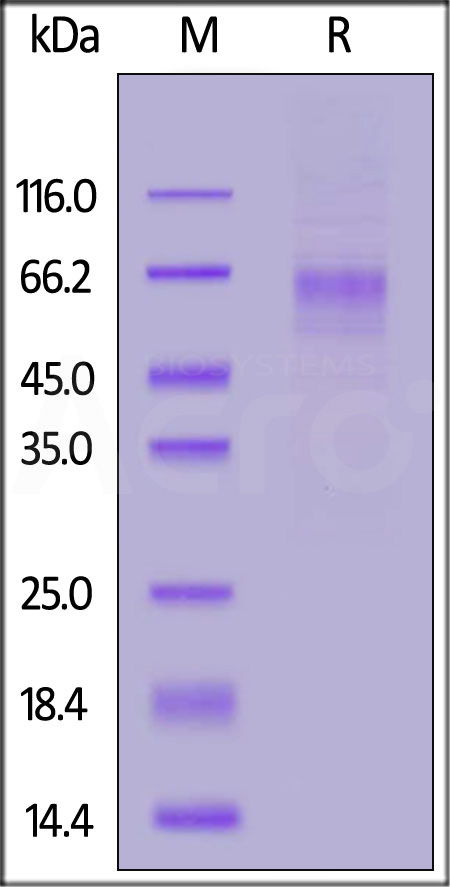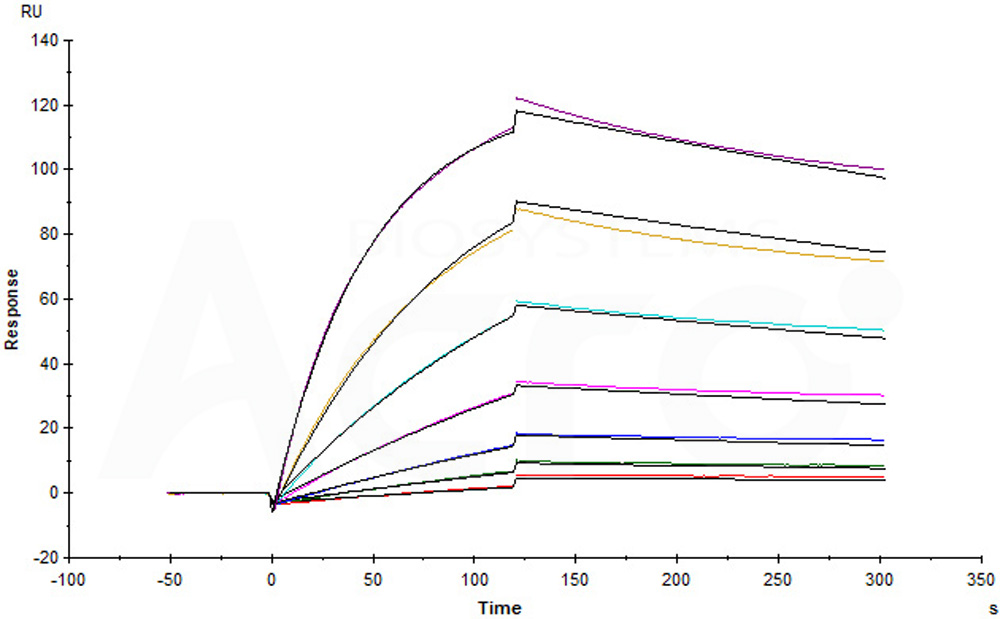分子别名(Synonym)
SLC39A6,LIV-1,ZIP6,Zinc transporter ZIP6,ZIP-6
表达区间及表达系统(Source)
Human LIV-1, His Tag (LV1-H5223) is expressed from human 293 cells (HEK293). It contains AA Phe 29 - Trp 325 (Accession # Q13433-1).
Predicted N-terminus: Phe 29
Request for sequence
蛋白结构(Molecular Characterization)

This protein carries a polyhistidine tag at the C-terminus.
The protein has a calculated MW of 35.5 kDa. The protein migrates as 50-65 kDa under reducing (R) condition (SDS-PAGE) due to glycosylation.
内毒素(Endotoxin)
Less than 1.0 EU per μg by the LAL method.
纯度(Purity)
>90% as determined by SDS-PAGE.
制剂(Formulation)
Lyophilized from 0.22 μm filtered solution in PBS, pH7.4 with trehalose as protectant.
Contact us for customized product form or formulation.
重构方法(Reconstitution)
Please see Certificate of Analysis for specific instructions.
For best performance, we strongly recommend you to follow the reconstitution protocol provided in the CoA.
存储(Storage)
For long term storage, the product should be stored at lyophilized state at -20°C or lower.
Please avoid repeated freeze-thaw cycles.
This product is stable after storage at:
- -20°C to -70°C for 12 months in lyophilized state;
- -70°C for 3 months under sterile conditions after reconstitution.
质量管理控制体系(QMS)
电泳(SDS-PAGE)

Human LIV-1, His Tag on SDS-PAGE under reducing (R) condition. The gel was stained with Coomassie Blue. The purity of the protein is greater than 90%.
活性(Bioactivity)-ELISA

Immobilized Human LIV-1, His Tag (Cat. No. LV1-H5223) at 1 μg/mL (100 μL/well) can bind Anti-LIV-1 antibody, Human IgG1 with a linear range of 0.2-2 ng/mL (QC tested).
Protocol
活性(Bioactivity)-SPR

Anti-LIV-1 mAb captured on CM5 chip via anti-human IgG Fc antibody can bind Human LIV-1, His Tag (Cat. No. LV1-H5223) with an affinity constant of 5.24 nM as determined in a SPR assay (Biacore T200) (Routinely tested).
Protocol
 +添加评论
+添加评论
- 012XXXXXXX0
- When I was searching for this protein, there were not many options until I found ACRO. Very happy about various species as well as tag choices. ELISA results are reproducible and consistent. The delivery was fast whereas others may take longer. The product information is clear and comprehensive, which is very important for the research.
- 2022-5-1
背景(Background)
LIV-1 is also known as SLC39A6, ZIP-6 and Zinc transporter ZIP6. May act as a zinc-influx transporter. Highly expressed in the breast, prostate, placenta, kidney, pituitary and corpus callosum. Weakly expressed in heart and intestine. Also highly expressed in cells derived from an adenocarcinoma of the cervix and lung carcinoma. Up-regulated by estrogen in breast cancer cells lines.























































 膜杰作
膜杰作 Star Staining
Star Staining










 Loading ...
Loading ...




